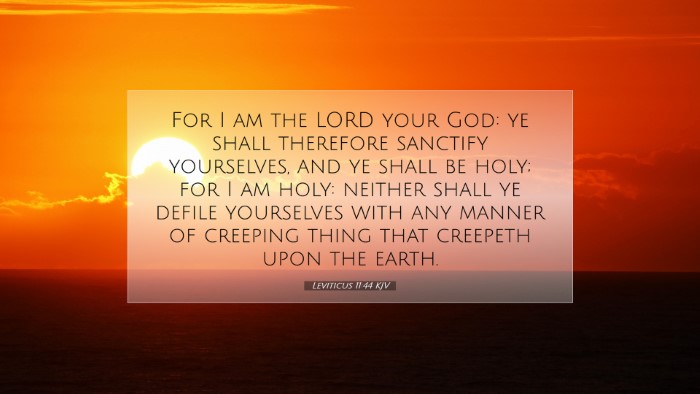Leviticus 11:44 - Commentary
Verse: "For I am the Lord your God: ye shall therefore sanctify yourselves, and ye shall be holy; for I am holy: neither shall ye defile yourselves with any manner of creeping thing that creepeth upon the earth."
General Overview
The verse from Leviticus 11:44 stands as a divine imperative, drawing a clear line between the holiness of God and the conduct expected of His people. This call to holiness is central not only in the context of dietary laws but also in shaping the moral and spiritual framework for the Israelites, which can be applied to contemporary faith practices.
The Meaning of Holiness
Matthew Henry: In his commentary, Henry emphasizes that holiness is intrinsic to God's nature and is a reflection of His moral perfection. The command to "be holy" implies a separation from the common and mundane, inviting believers to pursue a life that mirrors God's purity and righteousness.
Albert Barnes: Barnes elucidates that the term "sanctify yourselves" suggests an active engagement in setting oneself apart for God. This is not merely about outward compliance but involves an inner transformation that aligns with the divine character.
Adam Clarke: Clarke reinforces this by suggesting that holiness involves both a physical and moral separation. He notes that the laws regarding clean and unclean animals are not arbitrary but rather serve the purpose of teaching the Israelites about God's standards of purity and their duty to uphold them.
Understanding the Command
The command to sanctify oneself and be holy is grounded in the identity of God as Lord and God of the people. This covenant relationship highlights the necessity for the Israelites to reflect their God through their daily lives, particularly in what they consume.
- Covenantal Implications: The Israelites are called to live in a way that honors their covenant with the Lord, demonstrating their commitment to uphold His statutes.
- Separation from the Profane: The emphasis on not being defiled by creeping things symbolizes a broader principle of avoiding anything that might lead to spiritual impurity.
The Nature of Clean and Unclean
Matthew Henry: He emphasizes that the laws of clean and unclean serve as both a physical and spiritual reminder of the distinction between good and evil. Such distinctions help the community maintain a communal identity reflective of God's holiness.
Albert Barnes: Barnes points out that the dietary restrictions serve a dual purpose: they promote physical health and signify the larger spiritual truth about separation from sin and transgression against God's commands.
Adam Clarke: Clarke notes that these laws would have been particularly relevant in the context of other ancient Near Eastern cultures, which often engaged in idolatrous practices that compromised their holiness. Observing these dietary laws was a form of witness to the surrounding nations.
Spiritual Application
The themes presented in Leviticus 11:44 resonate deeply with New Testament teachings on holiness:
- Call to Holiness in the New Covenant: Just as the Old Testament Israelites were called to be holy, Christians are reminded in 1 Peter 1:16, "Because it is written, Be ye holy; for I am holy."
- Sanctification Process: The exhortation to sanctify oneself continues in the life of believers who are called to live in light of God's ongoing work of sanctification through the Holy Spirit.
- Spiritual Diet: The text invites a reflection on what believers "consume" spiritually, urging them to be cautious of influences that degrade their holiness.
Conclusion
Leviticus 11:44 serves as a powerful reminder that the Holy God calls His people into a relationship marked by holiness and sanctity. The command to separate from that which is unclean is not merely about dietary laws but reflects a broader spiritual truth applicable through all ages. The collective insights from Matthew Henry, Albert Barnes, and Adam Clarke underline the importance of living in accordance with God's character, thereby fulfilling the divine standard of holiness. This call remains ever relevant, compelling believers to pursue purity in a world often marked by moral ambiguity.


